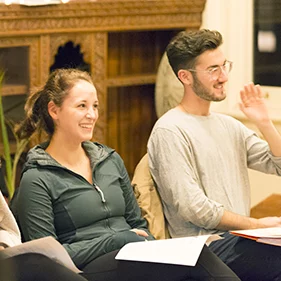An Oasis in the Chaos

When schools began announcing campus closures in March due to the coronavirus pandemic, students’ lives became increasingly uncertain. Steady class schedules, club meetings and social gatherings disappeared, leaving students with an overwhelming sense of loss and chaos.
Erica Frankel and her colleagues responsible for the Jewish Learning Fellowship, a 10-week seminar at college campuses across North America focusing on some of Judaism’s biggest questions, knew students needed stability and a chance to address these uncertainties. They knew just how to provide students with an outlet — by continuing the seminar online.
“Continuing JLF online was a no-brainer,” Frankel said. “Students were really craving Torah as a way to find meaning and explore their deep questions, and JLF is a community that provides that for them.”
Frankel and her team of three quickly went to work creating topical materials for local Hillel professionals to distribute to students and organizing trainings for seminar leaders on how to adapt JLF’s pedagogy to an online format.
At Hillels across the country, these trainings were put into action as JLF courses resumed over Zoom after spring break. For University of Pennsylvania Hillel, this meant directly addressing students’ fears and anxieties about the pandemic in their spring 2020 seminar about ‘Life’s Big Questions.’
“Students feel like they’re in mourning right now because they’ve lost half of their semester,” said Allison Sorgeloos, a Hillel International Springboard Fellow at Penn who led the seminar. “We wanted to cover topics that were relevant to the Jewish perspective on coronavirus and tackle subjects informed by what was on students’ minds.”
Sorgeloos encouraged students to recall positive memories from the school year and reflect on the impact that various friendships and experiences made on them. This type of memorializing is reminiscent of many of the events in the Jewish bereavement process, such as sitting shiva, saying the Mourner’s Kaddish and observing a yahrzeit.
Audrey Singer, a freshman at Penn Hillel, said this discussion helped her process her emotions about the semester ending so abruptly.
“I was going through the stages of grief. I was in denial for a while, then angry, and I kept thinking back to opportunities I had missed while I was still on campus,” Singer said. “It was really helpful to acknowledge that the emotions I was experiencing were grief and learn about the ways our traditions help us get through those hard times.”
While Penn Hillel students benefited from discussing the overwhelming uncertainties they were experiencing, Rabbi Melissa Simon, senior Jewish educator at North Carolina Hillel, found that her students wanted to use the few remaining weeks of the seminar to take their minds off of the chaos surrounding them.
“I asked students how they were feeling about the sessions, and they said it would be helpful to focus on parts of their lives unrelated to the virus,” Simon said. “They wanted to take a break from school and the stress of their daily lives while the rest of their routines kind of fell apart.”
Whether students were using the seminars to address the turmoil or take a break from it, the preparation by Frankel’s team ensured a smooth transition online and Zoom’s virtual tools helped Hillel professionals teach the lessons.
Rabbi Dan Epstein, senior Jewish educator at George Washington University Hillel, especially appreciated how Zoom’s use of chats, polls and breakout rooms helped facilitate discussions and aid in the sharing of ideas.
“The chat is great for shy people who don’t feel right commenting in words and it’s also a great way to share resources and post relevant links for the class to see,” Epstein said. “The breakout rooms were especially helpful in providing some social interaction and helping to maintain the connections between students that had been formed in the in-person sessions.”
Jonathan Lehrfeld, a GW junior who completed Rabbi Epstein’s JLF seminar, agreed that the Zoom tools enhanced his online learning experience.
“I’m a very visual learner and being able to click on and save links being sent in the chat box definitely helped my understanding of the lessons,” Lehrfeld said.
He also appreciated the sense of normalcy and stability that JLF’s continuation brought.
“The transition from in-person to online for JLF was rather smooth in comparison to the rest of the other chaotic transitions I was making for school,” Lehrfeld said. “When I was finishing my semester at home, any sense of normalcy I could find was helpful in processing the changes going on in society, and JLF helped with that a lot. I enjoyed having a regularly scheduled part of my week, especially a regularly scheduled Jewish part of my week, where I could meet and engage with my peers.”
Looking toward the future, Erica Frankel said she’s confident about JLF’s adaptability and positive impact on students.
She said, “Whether the fall semester is in person, online or a hybrid, we can pivot and create a really seamless experience.”